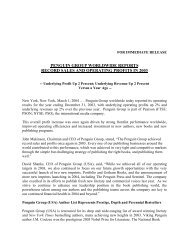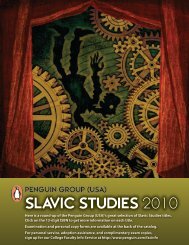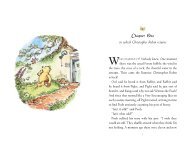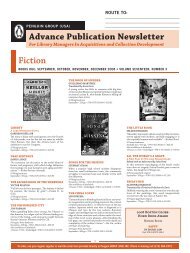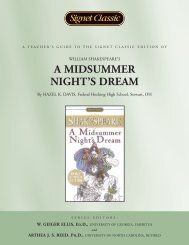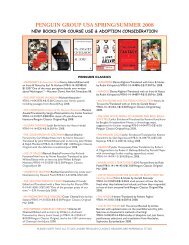Antony and Cleopatra TG - Penguin Group
Antony and Cleopatra TG - Penguin Group
Antony and Cleopatra TG - Penguin Group
You also want an ePaper? Increase the reach of your titles
YUMPU automatically turns print PDFs into web optimized ePapers that Google loves.
A TEACHER’S GUIDE TO THE SIGNET CLASSIC EDITION OF<br />
WILLIAM SHAKESPEARE’S<br />
ANTONY AND CLEOPATRA<br />
By LAURA FACCIPONTI, M.F. A.<br />
Assistant Professor of Drama, University of North Carolina at Asheville<br />
SERIES EDITORS:<br />
W. GEIGER ELLIS, ED.D., UNIVERSITY OF GEORGIA, EMERITUS<br />
<strong>and</strong><br />
ARTHEA J. S. REED, PH.D., UNIVERSITY OF NORTH CAROLINA, RETIRED
A Teacher’s Guide to the Signet Classic Edition of William Shakespeare’s <strong>Antony</strong> <strong>and</strong> <strong>Cleopatra</strong> 2<br />
INTRODUCTION<br />
William Shakespeare’s <strong>Antony</strong> <strong>and</strong> <strong>Cleopatra</strong> is a play filled with political intrigue, power struggles, war <strong>and</strong> its consequences,<br />
<strong>and</strong> the plight of two desperately impassioned lovers. Although the play’s action is slightly more complicated<br />
than Shakespeare’s other tragedies, <strong>Antony</strong> <strong>and</strong> <strong>Cleopatra</strong> provides an excellent means for students to study the multiple<br />
levels of subject matter contained in historical dramas. Teachers of English, history, political science, social studies, geography,<br />
mythology, <strong>and</strong> drama may all benefit from the themes explored in this play. The play, therefore, provides many<br />
opportunities for cross-curricular study.<br />
The very mention of the two title characters, <strong>Antony</strong> <strong>and</strong> <strong>Cleopatra</strong>, conjures images of love <strong>and</strong> the desperate measures<br />
taken in pursuit of love. Some have subtitled this play “The Greatest Love Story Ever Told.” Others argue that the play<br />
does not depict love, but rather presents a desperate infatuation that destroys a great Roman leader <strong>and</strong> a noble Egyptian<br />
queen. With either interpretation, the play offers a compelling love story that will intrigue students of any age or skill<br />
level. Additional themes of divided power, battles with formidable forces, <strong>and</strong> manipulative enemies <strong>and</strong> subordinates provide<br />
suspense <strong>and</strong> action. The juxtaposition of love <strong>and</strong> war is neatly wrapped in Shakespeare’s poetic language, thereby<br />
providing a literary work that is compelling <strong>and</strong> eloquent.<br />
The play at first appears quite complex with inconsistent character behavior, such as <strong>Cleopatra</strong>’s many mood swings. A<br />
sprawling location for the play’s action also complicates events as they occur on three different continents <strong>and</strong> on the seas<br />
that divide these l<strong>and</strong>s. Once character behavior is analyzed <strong>and</strong> questions are posed concerning motives, many of the<br />
play’s hidden truths become known <strong>and</strong> reveal a familiar plot of love <strong>and</strong> war. Likewise, when the play’s action is visually<br />
recreated by acting out scenes, exploring staging, or being a member of an audience enjoying the play or a film version<br />
of the play, many text references to geographical location, character motivation, <strong>and</strong> circumstance gain new meaning.<br />
After all, plays are written to be performed <strong>and</strong> observed, not just read.<br />
The following teacher’s guide provides materials to aid teachers in planning multi-layered exercises in text exploration.<br />
The guide provides historical context <strong>and</strong> a plot synopsis. Following this literary overview, teachers will find activities suggested<br />
for student investigation of the play’s content before, during, <strong>and</strong> after reading. A list of discussion questions for<br />
each act is also provided to assist teachers in developing class dialogues concerning the play’s action <strong>and</strong> thematic content.<br />
SHAKESPEARE’S ANTONY AND CLEOPATRA: AN OVERVIEW<br />
HISTORICAL CONTEXT<br />
Before one delves into Shakespeare’s play <strong>Antony</strong> <strong>and</strong> <strong>Cleopatra</strong>, it is important to look at the world of the main characters<br />
<strong>and</strong> the events that precede the play’s action.<br />
Approximately two thous<strong>and</strong> years ago, <strong>Cleopatra</strong>, “Queen of the Nile,” ruled over Egypt. Her capitol city, Alex<strong>and</strong>ria,<br />
was considered the greatest cultural <strong>and</strong> commercial center in the eastern Mediterranean. At the same time, Mark <strong>Antony</strong>,<br />
Octavius Caesar, <strong>and</strong> Lepidus were in joint control of the Roman Empire. This triumvirate was the result of Mark<br />
<strong>Antony</strong>’s defeat of Brutus <strong>and</strong> Cassius, who had assassinated Julius Caesar in 44 b.c. After his victory over the assassins,<br />
Mark <strong>Antony</strong> joined with Octavius Caesar <strong>and</strong> Lepidus, men who had remained loyal to Julius Caesar, <strong>and</strong> formed a joint<br />
rulership of the entire Roman Empire. They divided the Empire into three provinces: Octavius Caesar controlled Rome’s<br />
European provinces; Lepidus oversaw North Africa; <strong>and</strong> Mark <strong>Antony</strong> ruled Rome’s Asian territories.<br />
As the play begins, it is 41 B.C. <strong>and</strong> the Roman Empire is exp<strong>and</strong>ing its hold on surrounding l<strong>and</strong>s <strong>and</strong> would soon dominate<br />
the whole of their known world. But the Empire is experiencing civil unrest in Italy <strong>and</strong> faces a considerable threat<br />
from Parthia in its eastern provinces, Mark <strong>Antony</strong>’s territory. From the east, Parthia’s Sextus Pompeius is attempting to<br />
take control of the Mediterranean Sea, <strong>and</strong> the triumvirate faces a formidable force. While Octavius Caesar <strong>and</strong> Lepidus<br />
struggle to keep control in Italy, Mark <strong>Antony</strong> readies for war with the Parthians.<br />
Although recognized as a brave soldier <strong>and</strong> eloquent speaker, Mark <strong>Antony</strong> also has quite the reputation as a ladies man<br />
<strong>and</strong> a great appreciator of a good game <strong>and</strong> a witty joke. Knowing of Queen <strong>Cleopatra</strong>’s reputation as a provocative<br />
woman who uses her feminine charms, wit, <strong>and</strong> guile to compensate for being a woman in a traditionally male role, he<br />
commences what might be considered social intrigue. While Mark <strong>Antony</strong> readies his troops for battle, he comm<strong>and</strong>s<br />
Queen <strong>Cleopatra</strong> to appear before him when he arrives in Cilicia, a country in Asia Minor close to the occupied areas of<br />
Parthia. He plans to provoke <strong>Cleopatra</strong> by accusing her of aiding Cassius <strong>and</strong> Brutus in their earlier war against him, but<br />
<strong>Cleopatra</strong> has other plans for <strong>Antony</strong>.
A Teacher’s Guide to the Signet Classic Edition of William Shakespeare’s <strong>Antony</strong> <strong>and</strong> <strong>Cleopatra</strong> 3<br />
Determined to win over <strong>Antony</strong> as she had Julius Caesar, <strong>Cleopatra</strong> sets sail on the river Cydnus to meet <strong>Antony</strong>. Her<br />
barge is decorated with gleaming gold <strong>and</strong> propelled by servants rowing silver oars to the sounds of enchanting music.<br />
She drapes herself in gold robes <strong>and</strong> is fanned by young boys dressed as cupids. Her ladies-in-waiting, dressed as beautiful<br />
mermaids, steer the helm <strong>and</strong> tend the tackle. As she arrives, large crowds flock to the dock, drawn by the music <strong>and</strong><br />
the exotic perfumes that fill the air. The people rumor that Venus has come to play with the god Bacchus, <strong>and</strong> it is here<br />
that the tale of <strong>Antony</strong> <strong>and</strong> <strong>Cleopatra</strong> begins. <strong>Antony</strong> is dazzled by <strong>Cleopatra</strong>’s beauty, wit, <strong>and</strong> mystique, <strong>and</strong>, although<br />
the Parthians are now assembled in Mesopotamia ready to invade Syria, he leaves his wife <strong>and</strong> his post to depart for<br />
Alex<strong>and</strong>ria with the insistent <strong>and</strong> enchanting Queen <strong>Cleopatra</strong>.<br />
LIST OF THE PLAY’S CHARACTERS<br />
EGYPT<br />
ROME<br />
<strong>Cleopatra</strong>—Queen of Egypt<br />
Charmian <strong>and</strong> Iras—her personal attendants<br />
Alexas—her minister<br />
Seleucus—her treasurer<br />
Mardian—a eunuch<br />
Diomedes—a servant<br />
Clown—a simple country man<br />
Mark <strong>Antony</strong>, Octavius Caesar, Lepidus—the Triumvirate<br />
Octavia—sister to Octavius Caesar <strong>and</strong> second wife of <strong>Antony</strong><br />
Sextus Pompeius (Pompey)—leader of the faction opposed to the Triumvirate<br />
MARK ANTONY’S FOLLOWERS AND OFFICERS<br />
Domitius Enobarbus Decretas<br />
Ventidius A Soothsayer<br />
Eros Philo<br />
Demetrius Canidius<br />
Silius Scarus<br />
OCTAVIUS CAESAR’S FOLLOWERS AND OFFICERS<br />
Maecenas Dolabella<br />
Thidias Taurus<br />
Proculeius Gallus<br />
Agrippa<br />
SEXTUS POMPEIUS’S FOLLOWERS AND OFFICERS<br />
Menas <strong>and</strong> Menecrates—pirates<br />
Varrius<br />
Messengers, Servants, Officers, Soldiers, Sentries, Guards, Watchmen
A Teacher’s Guide to the Signet Classic Edition of William Shakespeare’s <strong>Antony</strong> <strong>and</strong> <strong>Cleopatra</strong> 4<br />
SYNOPSIS<br />
At the play’s opening, <strong>Antony</strong>, who had ab<strong>and</strong>oned his wife Fulvia <strong>and</strong> his post in time of war, is indulging in Alex<strong>and</strong>ria’s<br />
lavish lifestyle <strong>and</strong> is fully infatuated by <strong>Cleopatra</strong>. Then <strong>Antony</strong> learns from a messenger that his wife <strong>and</strong> his brother<br />
Lucius were the cause of the unrest in Italy <strong>and</strong> had engaged in battle with Octavius Caesar. A new messenger brings the<br />
unfortunate news that <strong>Antony</strong>’s wife, Fulvia, died in Greece after having fled Italy (I,i). <strong>Antony</strong> mourns Fulvia’s death <strong>and</strong><br />
resolves to leave <strong>Cleopatra</strong> <strong>and</strong> return to Rome in order to counter Pompey’s threat in Asia. <strong>Cleopatra</strong> throws a passionate<br />
tantrum when she hears of <strong>Antony</strong>’s announced departure. She rants <strong>and</strong> raves to <strong>Antony</strong> about love <strong>and</strong> devotion <strong>and</strong><br />
accuses him of not loving her fully. But as quickly as the tides turn, <strong>Cleopatra</strong> begs his forgiveness for her outbursts <strong>and</strong><br />
wishes him victory. <strong>Antony</strong> departs for Rome, but <strong>Cleopatra</strong> knows he will return to her (I,iii).<br />
In Rome, Octavius Caesar condemns <strong>Antony</strong> for being self-indulgent, living a debauched life in Alex<strong>and</strong>ria <strong>and</strong> neglecting<br />
his duties to Rome, but Lepidus is softer in his judgement of <strong>Antony</strong>. A messenger announces that Sextus Pompeius has gained<br />
allegiance from many Romans, <strong>and</strong> that his allies, the pirates of Menecrates <strong>and</strong> Menas, threaten the borders of Italy. Octavius<br />
<strong>and</strong> Lepidus hope <strong>Antony</strong> will return to his position <strong>and</strong> unite the triumvirate in a combined war against the Parthians (I,iv).<br />
<strong>Cleopatra</strong> daydreams of <strong>Antony</strong> <strong>and</strong> wonders how he is faring in Rome when Alexas, her minister, brings her a pearl from<br />
<strong>Antony</strong> with <strong>Antony</strong>’s promise to extend her empire. She boasts of how she enchanted both Julius Caesar <strong>and</strong> Gnaeus<br />
Pompey in the past, <strong>and</strong> to seal her deal with <strong>Antony</strong>, she sets out to return her love to <strong>Antony</strong> in a letter (I,v).<br />
In Sicily, Pompey waits for a sign from the gods that he should make his final move for power over the triumvirate. He<br />
counts on <strong>Cleopatra</strong> distracting <strong>Antony</strong> from the war <strong>and</strong> keeping him in Egypt (II,i).<br />
<strong>Antony</strong> returns to Rome <strong>and</strong> is met by a furious Octavius Caesar who accuses <strong>Antony</strong> of inciting the war in Italy. <strong>Antony</strong><br />
denies the accusations, blaming Fulvia’s wild nature, but the men are clearly at odds <strong>and</strong> the unity of the triumvirate is<br />
threatened. Agrippa, Octavius’s officer, proposes a remedy to mend the rift between <strong>Antony</strong> <strong>and</strong> Octavius. As proof of<br />
<strong>Antony</strong>’s devotion to Octavius <strong>and</strong> Rome, Agrippa proposes that <strong>Antony</strong>, now a widower, marry Octavius’s newly widowed<br />
sister, Octavia. To prove his devotion <strong>and</strong> seal their alliance, <strong>Antony</strong> agrees, <strong>and</strong> Octavius consents to an immediate<br />
wedding, before the attack on Pompey (II,iii).<br />
A messenger comes to tell <strong>Cleopatra</strong> that <strong>Antony</strong> is to marry Octavia. Enraged, <strong>Cleopatra</strong> beats the messenger <strong>and</strong> sends<br />
him off to get details of Octavia’s age <strong>and</strong> beauty (II, v). He later returns <strong>and</strong>, having learned from his previous encounter<br />
with <strong>Cleopatra</strong>, describes Octavia in the most unflattering way so as to please <strong>Cleopatra</strong> <strong>and</strong> escape further beatings.<br />
Satisfied, <strong>Cleopatra</strong> commends the servant on his graphic descriptions (III,iii).<br />
Meanwhile in Italy, after some negotiations, Pompey agrees to peace <strong>and</strong> invites his past enemies on board his ship for a<br />
banquet. Many side discussions ensue concerning the battles, the questionable future of <strong>Antony</strong> <strong>and</strong> Octavia, <strong>and</strong> persistent<br />
doubts about a united triumvirate. Lepidus drinks too much <strong>and</strong> the servants mock him while Menas, a pirate unhappy<br />
with the treaty, pulls Pompey aside <strong>and</strong> offers to cut the throats of <strong>Antony</strong>, Lepidus, <strong>and</strong> Caesar. Pompey refuses to conspire<br />
with Menas, but Pompey admits that he would have commended him had Menas done the deed without his knowledge<br />
(II, vii). Disappointed in Pompey’s missed opportunity for power, Menas later decides to desert Pompey (II,vii).<br />
At the announced defeat of the Parthians, <strong>Antony</strong>, Octavia, <strong>and</strong> Caesar have a heartfelt farewell as <strong>Antony</strong> <strong>and</strong> Octavia<br />
depart for Athens (III,ii). No sooner does the couple arrive in Athens than they learn of new trouble, stirred this time by<br />
Octavius Caesar. Caesar has broken the treaty <strong>and</strong> declared war on Pompey. For Octavia’s sake, <strong>Antony</strong> agrees not to act<br />
against Caesar in anger <strong>and</strong> instead offers to act as mediator. Octavia leaves for Rome to be with her brother, Caesar<br />
(III,iv). Later, <strong>Antony</strong>’s personal assistant, Eros, reports to Enobarbus that Caesar has betrayed Lepidus by first using him<br />
in his attack on Pompey <strong>and</strong> then arresting him for breaking the treaty (III,v). <strong>Antony</strong> is enraged when he learns of this<br />
deceit <strong>and</strong> dem<strong>and</strong>s that Lepidus be deposed <strong>and</strong> his revenue divided between Caesar <strong>and</strong> <strong>Antony</strong>.<br />
Meanwhile, Octavia returns to Rome. Offended that his sister had not been accompanied by a military escort of suitable<br />
pomp, Caesar vows revenge for the disgraceful treatment of his sister <strong>and</strong> for <strong>Antony</strong>’s proclamation giving Rome’s eastern<br />
provinces to <strong>Cleopatra</strong> <strong>and</strong> her children (III,vi).<br />
Octavius Caesar <strong>and</strong> <strong>Antony</strong> engage in battle, <strong>and</strong> <strong>Cleopatra</strong> insists on being present, much to the disapproval of <strong>Antony</strong>’s<br />
comm<strong>and</strong>ers. <strong>Antony</strong> decides to fight Caesar at sea, which <strong>Cleopatra</strong> supports, but others advise against such a strategy.<br />
But <strong>Antony</strong> insists, <strong>and</strong> all blame <strong>Cleopatra</strong>’s bad influence for <strong>Antony</strong>’s poor decision (III,vii). <strong>Antony</strong> <strong>and</strong> <strong>Cleopatra</strong> go<br />
to battle at sea, but the Egyptian fleet soon turns <strong>and</strong> flees, <strong>and</strong> <strong>Antony</strong>’s ships follow <strong>Cleopatra</strong>’s in retreat. <strong>Antony</strong> loses<br />
the battle in disgrace.
A Teacher’s Guide to the Signet Classic Edition of William Shakespeare’s <strong>Antony</strong> <strong>and</strong> <strong>Cleopatra</strong> 5<br />
<strong>Antony</strong> delivers a passionate speech, lamenting his poor strategy <strong>and</strong> advising his followers to flee as well. He offers his<br />
treasure to them as compensation. <strong>Cleopatra</strong> begs <strong>Antony</strong>’s forgiveness for her cowardliness. Softened by her heartfelt plea,<br />
<strong>Antony</strong> forgives her (III,xi).<br />
Through the messages of his ambassador, <strong>Antony</strong> requests that Caesar allow him to live in Egypt with <strong>Cleopatra</strong>. If not,<br />
<strong>Antony</strong> asks that Ceasar grant him leave to carry on a private life in Athens. <strong>Cleopatra</strong> also surrenders to Caesar <strong>and</strong> asks<br />
that the crown of the Ptolemies (Egypt) be reserved for her heirs. Caesar refuses <strong>Antony</strong>’s requests but agrees to<br />
<strong>Cleopatra</strong>’s, provided that she exile <strong>Antony</strong> in disgrace or kill him (III,xii).<br />
Back at <strong>Cleopatra</strong>’s palace, <strong>Antony</strong> learns of Caesar’s answer <strong>and</strong>, against all odds, dem<strong>and</strong>s a h<strong>and</strong>-to-h<strong>and</strong> combat with<br />
Caesar. Having finally lost his faith in <strong>Antony</strong>’s power of reason, Enobarbus decides to leave <strong>Antony</strong>’s service. Caesar sends<br />
his officer Thidias to win <strong>Cleopatra</strong>. But when Thidias is caught kissing <strong>Cleopatra</strong>’s h<strong>and</strong>, <strong>Antony</strong> has him whipped.<br />
Humiliated, Thidias scurries back to Caesar. <strong>Antony</strong> accuses <strong>Cleopatra</strong> of being a faithless strumpet, but she swears her<br />
loyalty <strong>and</strong> he, once more, forgives her. <strong>Antony</strong> declares a last night of revelry before the final battle, where he has promised<br />
to fight Caesar to the death (III,xiii).<br />
<strong>Antony</strong> prepares for battle <strong>and</strong> bids a tearful farewell to his loyal servants (IV,ii). While in battle camp he learns that the loyal<br />
Enobarbus has deserted him at last. He forgives Enobarbus <strong>and</strong> sends his belongings after him along with a number of<br />
additional gifts (IV, v). Enobarbus, learning of <strong>Antony</strong>’s forgiveness <strong>and</strong> generosity, is wracked with guilt over his desertion.<br />
He refuses to fight in Caesar’s army against <strong>Antony</strong> <strong>and</strong> vows to die in a ditch, considering it an appropriately foul end<br />
to such a foul deed (IV,vi). As the watchmen carry him away, the dying Enobarbus begs for <strong>Antony</strong>’s forgiveness (IV,ix).<br />
Pursued by <strong>Antony</strong>’s fierce forces, Caesar’s troops retreat (IV,viii). <strong>Antony</strong> returns to Alex<strong>and</strong>ria <strong>and</strong> a proud <strong>Cleopatra</strong> (IV,viii).<br />
Then <strong>Antony</strong> learns that Caesar’s navy is preparing for a counterattack at sea, <strong>and</strong> he orders his fleet into battle (IV,x). <strong>Antony</strong><br />
leaves Alex<strong>and</strong>ria to observe the battle, <strong>and</strong> then returns, enraged. He has been betrayed! The Egyptian fleet has surrendered<br />
<strong>and</strong> has appeared to support Caesar’s fleet. Irreconcilable, he accuses <strong>Cleopatra</strong> of betrayal <strong>and</strong> vows to kill her (IV,xii).<br />
Fearing for her life, <strong>Cleopatra</strong> locks herself high in her monument. She sends Mardian, a eunuch, to tell <strong>Antony</strong> that she<br />
has killed herself <strong>and</strong> the last word on her lips had been “<strong>Antony</strong>” (IV,xiii). Mardian dutifully reports on <strong>Cleopatra</strong>’s “suicide.”<br />
Overcome by the loss, <strong>Antony</strong> pledges to join <strong>Cleopatra</strong> in death. He orders Eros to make one final act as his servant<br />
<strong>and</strong> kill him. Reluctantly, Eros draws his sword, but asks <strong>Antony</strong> to turn away as he does this hateful deed. At the<br />
last moment, Eros kills himself instead. <strong>Antony</strong> praises Eros’s valiant act <strong>and</strong> takes it as a lesson for himself. <strong>Antony</strong><br />
impales himself on his own sword but fails to strike a fatal wound. Guards swarm into the room <strong>and</strong> halt his further<br />
attempts at suicide. Diomedes, <strong>Cleopatra</strong>’s servant, arrives to announce that <strong>Cleopatra</strong> is not dead after all. Mortally<br />
wounded, <strong>Antony</strong> asks to be taken to <strong>Cleopatra</strong>’s side so that he may die in his lover’s arms (IV,xiv).<br />
<strong>Antony</strong> is carried to <strong>Cleopatra</strong>’s monument <strong>and</strong> pleads for one last kiss. Fearing capture by Octavius, <strong>Cleopatra</strong> refuses to<br />
leave the monument. Instead, she bids her ladies to lift <strong>Antony</strong> up to her. He dies in her arms. Overcome by the loss of<br />
her lover, <strong>Cleopatra</strong> vows to take her own life (IV,xv).<br />
At his camp, Caesar learns of <strong>Antony</strong>’s suicide. He mourns <strong>Antony</strong>’s death, claiming that such a death should shatter the very<br />
world. An Egyptian servant arrives asking Caesar what will become of <strong>Cleopatra</strong>. Caesar assures the servant that he will treat<br />
<strong>Cleopatra</strong> gently <strong>and</strong> with dignity. Fearing <strong>Cleopatra</strong>’s irrational behavior, Caesar sends his officer Proculeius to ensure<br />
that <strong>Cleopatra</strong> is brought back to Rome alive, for her arrival there would provide evidence of Caesar’s great victory (V,i).<br />
Proculeius arrives at <strong>Cleopatra</strong>’s monument <strong>and</strong> informs her that Caesar has assured both her safety <strong>and</strong> her son’s continued<br />
rule of Egypt. But she fears the servant is untrustworthy <strong>and</strong> attempts to kill herself with a dagger. Proculeius comm<strong>and</strong>s<br />
his guards to stop her, but she vows that she will find another way to kill herself rather than become Caesar’s captive.<br />
Dolabella, Caesar’s officer, reveals that Caesar instead intends to take her <strong>and</strong> her children to Rome. Fearful that she would<br />
have to endure many indignities if she complied, <strong>Cleopatra</strong> resolves to commit suicide in the “high Roman fashion.”<br />
<strong>Cleopatra</strong> prepares for death. She invites into her chambers a trusted countryman who arrives with a basket of figs in<br />
which he has concealed several poisonous asps. As <strong>Cleopatra</strong> bids farewell to her ladies, Iras <strong>and</strong> Charmian, Iras suddenly<br />
falls dead at her feet. Worried that her attendant will meet <strong>Antony</strong> in death before she does, <strong>Cleopatra</strong> quickly clutches<br />
an asp to her breast. She applies another to her arm <strong>and</strong> soon dies from their bites. As one of Caesar’s guards enters,<br />
Charmian announces that the escort was too slow to stop an act so fitting of a noble queen. Charmian applies the last asp<br />
to herself <strong>and</strong> dies. Caesar, upon learning of <strong>Cleopatra</strong>’s valiant death, pays tribute to her courage <strong>and</strong> noble end. He<br />
orders her burial next to <strong>Antony</strong> in honorable graves accompanied with great ceremony (V,ii).
A Teacher’s Guide to the Signet Classic Edition of William Shakespeare’s <strong>Antony</strong> <strong>and</strong> <strong>Cleopatra</strong> 6<br />
BEFORE READING THE PLAY<br />
Before reading the play, students should explore the time period <strong>and</strong> historical significance of the play’s action. They should<br />
become familiar with the famous tales of Julius Caesar, Marcus <strong>Antony</strong>, <strong>and</strong> Queen <strong>Cleopatra</strong>, which were well known to<br />
Elizabethans. Students should become acquainted with the topographical world in 44 b.c. <strong>and</strong> the effects of divided power<br />
on war <strong>and</strong> l<strong>and</strong> acquisitions. Finally, students should delve into the language of Shakespeare’s play, with its implied meanings<br />
<strong>and</strong> poetic language. An underst<strong>and</strong>ing of the effects of iambic pentameter <strong>and</strong> purposeful switches to prose to imply<br />
character, class, subtext, <strong>and</strong> action is essential for higher levels of literary appreciation <strong>and</strong> underst<strong>and</strong>ing.<br />
Following is a list of exercises <strong>and</strong> assignments that will support this manner of text <strong>and</strong> content exploration. Any of the<br />
exercises may be exp<strong>and</strong>ed or adapted as time <strong>and</strong> facilities allow.<br />
I. THE STRATEGY GAME<br />
This map game is designed to help students explore the concepts of divided power, leadership strategies, <strong>and</strong> the stakes<br />
of war. The game is specific to the play’s action by including a triumvirate, homel<strong>and</strong> protection, love <strong>and</strong> betrayal, <strong>and</strong><br />
five possible individuals seeking control.<br />
SETTING UP THE GAME<br />
Supplies needed:<br />
1. One large map of the Roman Empire <strong>and</strong> its surrounding territories in approximately 41 b.c. for each group of students.<br />
(To be used as a game board. Alternately, if more familiar geography is preferred, use a map of the United States with<br />
Canada, <strong>and</strong> Mexico as the surrounding territories <strong>and</strong> the U.S. governed by a triumvirate.)<br />
2. Five large game pieces to represent five leaders <strong>and</strong> 60 smaller game pieces to represent five armies of 12 pieces each.<br />
(Either chess or checkers pieces, coins or toy soldiers are recommended as game pieces.)<br />
3. Strategy Cards made by writing individual strategies on index cards (suggestions for strategy statements below).<br />
4. Small pieces of scrap paper <strong>and</strong> pens or pencils to write Declarations.<br />
• Divide the class into groups of five. If numbers do not work out evenly, assign a sixth person to the group to act as<br />
the mediator who requests Declarations <strong>and</strong> h<strong>and</strong>s out Strategy Cards.<br />
• Designate each group member to one of the following (A,B,C,D or E): Triumvirate of Rome (A,B,C), Ruler of Egypt (D),<br />
Ruler of Parthia (E).<br />
• Give each student a large game piece to represent his ruler. Each ruler receives an army, represented by 12 game pieces.<br />
PLAYING THE GAME<br />
A simplified list of steps:<br />
1. Divide Power <strong>and</strong> Territories amongst five Rulers.<br />
2. Round One: (a) Strategy Cards dealt, (b) invitation for Requests for Allies made <strong>and</strong> Requests for Allies notes exchanged,<br />
(c) Declarations made by all five Rulers, (d) game pieces moved to war or retreat locations, (e) losses <strong>and</strong> gains of armies<br />
exchanged, (f) armies stay where they are <strong>and</strong> go on to next round.<br />
3. Round Two: same as above.<br />
4. Round Three: same as above, but in step (e) game pieces are counted, (f) all Strategy cards <strong>and</strong> notes of Requests for Allies<br />
are exposed. Leaders with the most game pieces are announced as winners.<br />
To start the game, the Triumvirate divides the Roman Empire into three territories of sub-rule. The Ruler of the African<br />
continent is (A), the Ruler of the Asian continent is (B), <strong>and</strong> the Ruler of the European continent is (C).
A Teacher’s Guide to the Signet Classic Edition of William Shakespeare’s <strong>Antony</strong> <strong>and</strong> <strong>Cleopatra</strong> 7<br />
The game consists of three rounds. To play each round:<br />
• Deal out one Strategy Card to each ruler. (Use the Strategy Card to influence your Declaration <strong>and</strong> strategy during the round.)<br />
• Privately read your Strategy Card <strong>and</strong> decide how this will influence your Declaration. Leaders do not conspire before<br />
they announce their Declarations, but if one ruler wishes to request the aid of another ruler in war before the<br />
Declarations are made, a “Request for Allies” is offered.<br />
• Request Allies by passing small notes to certain rulers. The contents of the notes are not to be known until all three<br />
rounds are complete. Once declarations are made there is no turning back. The rulers must make Declarations that<br />
are based on the Strategy Cards, for the card’s strategies will all be exposed after all three rounds have been played.<br />
(This assures that students, as in life <strong>and</strong> in the play’s action, are not always sure whom to trust <strong>and</strong> exactly how their<br />
actions are motivated.)<br />
• Make your declaration of war on a specific ruler or territory, or plea for peace or abstinence, by making a Declaration<br />
Statement one at a time. (Examples of Declaration Statements given below.)<br />
• After all five Declarations are made, move the game pieces representing armies <strong>and</strong> rulers to declared locations of<br />
wars, or in retreat to your own l<strong>and</strong>. (Armies placed in war will either win or lose soldiers. Those that stay at home<br />
<strong>and</strong> are not attacked, lose nothing, but gain nothing.)<br />
• If you combine forces with another ruler <strong>and</strong> outnumber another army placed on the same territory, the outnumbered<br />
army gives up one half of his/her soldiers to the larger army <strong>and</strong> these soldiers are divided equally amongst the<br />
winning rulers. If you do not combine forces <strong>and</strong> armies are equal, the round is a draw.<br />
The leader with the most game pieces after three rounds wins <strong>and</strong> holds whatever l<strong>and</strong> his/her army has conquered over<br />
other armies.<br />
SUGGESTIONS FOR STRATEGY CARDS:<br />
• “You are in love with Ruler D <strong>and</strong> will proclaim whatever Ruler D proclaims.”<br />
• “You don’t trust Ruler A’s ability to make rational decisions <strong>and</strong> will not side with Ruler A in war.”<br />
• “You have great loyalty towards Ruler C <strong>and</strong> will back Ruler C in any war, unless you suspect that Ruler C has<br />
betrayed you.”<br />
• “You believe that the Triumvirate is disorganized <strong>and</strong> ask Ruler D to side with you in overtaking all of the Triumvirate<br />
territory.”<br />
• “You do not want to go to war <strong>and</strong> risk losing your beautiful country, so you refrain from attacking anyone, even if<br />
it means betraying another Ruler <strong>and</strong> fleeing battle.”<br />
• “You suspect that Ruler E has broken the treaty with you, <strong>and</strong> you declare war.”<br />
• “You are angry with Ruler A <strong>and</strong> are determined to fight, no matter what the consequences.”<br />
• “You don’t trust anyone, <strong>and</strong> so will side with no one.”<br />
• “You will promise anything so that no one will be angry with you, but you will turn tail <strong>and</strong> run in war, rather than<br />
face defeat or vulnerability.”<br />
• “You believe you are invincible <strong>and</strong> will fight with anyone for more control over l<strong>and</strong>.”<br />
SUGGESTIONS FOR DECLARATIONS:<br />
Declarations are to be made as announcements of battle, retreat, wishes for peace, <strong>and</strong> for forming an ally with another<br />
Ruler. Examples:<br />
• “I will ally with D, <strong>and</strong> go to war if he/she proclaims war on anyone.”<br />
• “I st<strong>and</strong> my ground <strong>and</strong> go to war with anyone who attacks my borders.” • “I will not partake in any of these wars<br />
<strong>and</strong> hope that all of you will refrain from battle.”
A Teacher’s Guide to the Signet Classic Edition of William Shakespeare’s <strong>Antony</strong> <strong>and</strong> <strong>Cleopatra</strong> 8<br />
II. THE ANCIENT WORLD<br />
Acquaint students with the geography of <strong>Antony</strong>’s <strong>and</strong> <strong>Cleopatra</strong>’s world by posting a map of the world depicting the division<br />
of l<strong>and</strong> <strong>and</strong> ancient names of these l<strong>and</strong>s as listed in the play.<br />
• Show students the territories governed by the five rulers in the play.<br />
• Use the map as a visual guide to the play’s action so that students can see territories lost <strong>and</strong> gained.<br />
• Use color-coded push-pins, flags, or post-it notes to represent where rulers are during each scene. Also keep track of<br />
each ruler’s armies.<br />
• Have students point to where each scene takes place so they can follow the action.<br />
Students can also create map images of the play’s action using a computer <strong>and</strong> a simple graphics program, like Power<br />
Point. They can highlight territories gained <strong>and</strong> lost during the play’s action <strong>and</strong> present these images to the class showing<br />
how the play’s world changes with each battle.<br />
III. STORYTELLING<br />
Shakespeare, one of the greatest storytellers of the English language, adapted most of his plays from popular, well-known<br />
tales. As any good storyteller does, he took artistic license with these tales <strong>and</strong> made his own adaptations of the original.<br />
So, too, could the students.<br />
• Before reading the play, tell students the beginning of the story of <strong>Antony</strong> <strong>and</strong> <strong>Cleopatra</strong> <strong>and</strong> then have them finish<br />
the story, predicting how it will end.<br />
• Students can write their own stories or small groups can create group stories with each member adding to it.<br />
• Then they can simply tell their version to the class or explore an original method of presenting the story. As<br />
Shakespeare used the stage <strong>and</strong> drama, students could also use drama or comic strips, radio plays, spoof skits, readers’<br />
theater, soap opera, poetry, rap, ballad, mime, dance, video, email exchanges, news announcement, etc. This can<br />
be a lengthy <strong>and</strong> creative exercise where students invest in the possibilities <strong>and</strong> methods of storytelling.<br />
• Once all stories are presented, students can discuss <strong>and</strong> perhaps vote on the most likely ending to match Shakespeare’s version.<br />
IV. WHAT MAKES A TRAGEDY?<br />
Introduce students to Aristotle’s Poetics. Outline the contents of an effective tragedy interpreted from Aristotle’s Poetics,<br />
including:<br />
1. Tragedy—a serious play typically dealing with the problems of a central character, or protagonist, leading to an unhappy<br />
or disastrous ending brought on by fate <strong>and</strong> a tragic flaw in the main character<br />
2. Hubris—wanton insolence or arrogance resulting from excessive pride or from passion<br />
3. Foreshadowing—to indicate or suggest beforeh<strong>and</strong><br />
4. Climax—the highest point of interest or tension in a drama, <strong>and</strong> the turning point of the play’s action<br />
5. Catharsis—the purifying of the emotions or relieving of emotional tensions<br />
6. Denouement—the outcome, solution, unraveling or clarification of a plot in a drama<br />
Discuss Aristotle’s six constituent elements of a Tragedy, ranked in order of priority:<br />
1. Plot—the arrangement of dramatic incidents<br />
2. Characters—the people represented in the play<br />
3. Thought or Theme—the ideas explored<br />
4. Language—the dialogue <strong>and</strong> poetry<br />
5. Music—the choral odes (specific to Greek plays)<br />
6. Spectacle—scenery <strong>and</strong> other visual elements
A Teacher’s Guide to the Signet Classic Edition of William Shakespeare’s <strong>Antony</strong> <strong>and</strong> <strong>Cleopatra</strong> 9<br />
Relate these elements to other contemporary real-life tragedies like politicians or leaders who are sc<strong>and</strong>alized publicly for<br />
having extra-marital affairs, committing crimes or for covering a lie. Students can also read Greek <strong>and</strong> Roman myths,<br />
other tragic plays by Shakespeare, <strong>and</strong>/or watch popular tragic movies, like Braveheart. As students read <strong>Antony</strong> <strong>and</strong><br />
<strong>Cleopatra</strong> they should identify places where these elements are exposed through the play’s action <strong>and</strong> discuss the characters’<br />
flaws <strong>and</strong> the cause of each character’s downfall or success.<br />
V. UNDERSTANDING REAL VS. DRAMATIC ACTION<br />
Have students read books or watch documentaries that depict life in Rome, Egypt, <strong>and</strong> the ancient world. They can<br />
explore transportation, styles of dress, methods of war as well as uniforms <strong>and</strong> arms. This provides students with clear<br />
visual images of the characters <strong>and</strong> their lifestyles. Likewise, they will begin to underst<strong>and</strong> how long it took to move armies<br />
from place to place. Students can then underst<strong>and</strong> how, within the play’s two-hour dramatic action, many years elapse.<br />
During the time of the play’s five acts, <strong>Antony</strong> <strong>and</strong> <strong>Cleopatra</strong> have born a number of children together, <strong>and</strong> many battles<br />
have been won or lost.<br />
Have students speculate how much time has passed during the play’s action <strong>and</strong> look to the text to support these speculations.<br />
For example, in Act III, scene vi, Caesar complains of <strong>Antony</strong>’s public display of his bastard children <strong>and</strong> his declarations<br />
to give more of the Triumvirate’s l<strong>and</strong> to <strong>Cleopatra</strong>:<br />
CAESAR: I’th’marketplace, on a tribunal silvered,<br />
<strong>Cleopatra</strong> <strong>and</strong> himself in chairs of gold<br />
Were publicly enthroned; at the feet sat<br />
Caesarion, whom they call my father’s son,<br />
And all the unlawful issue that their lust<br />
Since then hath made between them, Unto her<br />
He gave the stablishment of Egypt, made her<br />
Of lower Syria, Cyprus, Lydia<br />
Absolute queen<br />
VI. KEEPING TRACK OF THE CHARACTERS AND THEIR LOYALTIES<br />
Have students divide a piece of paper into four columns <strong>and</strong> place the rulers, Caesar, <strong>Antony</strong>, <strong>Cleopatra</strong>, <strong>and</strong> Pompey, at<br />
the top of each column. Underneath, list his/her loyal followers. Students can place this chart next to the script as they<br />
read the play <strong>and</strong> keep track of the loyalties of the minor characters. As minor characters betray their leaders, retreat or<br />
die, students can either cross out or move them to other columns, keeping track of power shifts.<br />
VII. KNOWING THE STORY AS THE ELIZABETHANS DID<br />
Most Elizabethans were familiar with the tale of <strong>Antony</strong> <strong>and</strong> <strong>Cleopatra</strong> before Shakespeare produced his drama about<br />
them. Shakespeare’s source was most likely Plutarch <strong>and</strong> it is included as supplemental reading in the Signet Classic text.<br />
Students can read Plutarch’s story before they read the play <strong>and</strong> later discuss how Shakespeare adapted Plutarch’s famous<br />
tale to the stage. Assign portions of Plutarch’s tale to small groups to read <strong>and</strong> relate to the class either by oral reading or<br />
storytelling.
A Teacher’s Guide to the Signet Classic Edition of William Shakespeare’s <strong>Antony</strong> <strong>and</strong> <strong>Cleopatra</strong> 10<br />
WHILE READING THE PLAY<br />
ACT I<br />
I. FORMING INDIVIDUAL INTERPRETATIONS OF SCENES<br />
Many scenes offer an opportunity for individual interpretations. For example: where <strong>Cleopatra</strong>’s integrity <strong>and</strong> honesty are<br />
questionable, where an officer’s or servant’s loyalty sways, or where humor <strong>and</strong> sarcasm are used to expose subtext. Can<br />
students form their own opinions of these interpretations? If so, how do they interpret them?<br />
• Divide the characters’ parts amongst the students, reading the play orally. Discuss interpretations of scenes <strong>and</strong> character<br />
motivations.<br />
• Divide the class into small groups, assigning a scene to each group. Have them rehearse, practicing voice, inflection,<br />
<strong>and</strong> emotion. They can prepare an introduction to the scene, set the stage, <strong>and</strong> then read the scene aloud with their<br />
practiced interpretations while the rest of the class attempts to summarize the scene in writing. The class can then<br />
discuss perceived interpretations gained through these presentations.<br />
• Staging methods can also be explored by individuals or small groups. For example, in Act IV, scene xv, <strong>Cleopatra</strong> is<br />
in her monument with her ladies. She asks them to help lift the dying <strong>Antony</strong> up to her so that she will not have to<br />
leave the safety of her monument. Assign this same scene to a few different individuals or groups <strong>and</strong> compare interpretations<br />
<strong>and</strong> solutions to its staging challenge.<br />
II. EXPLORING THE SOUNDS OF THE PLAY<br />
Shakespeare’s plays were performed outdoors with minimal props. Elizabethan theater practitioners had to be quite creative<br />
using inexpensive devices to create magic <strong>and</strong> action on stage. This activity reinforces the live action <strong>and</strong> stage sounds<br />
of drama, as well as introduces students to simplified staging devices as a means of bringing a play to life.<br />
Assign small groups to specific scenes from the play. Provide each group with a cassette recorder. Have students practice reading<br />
the scenes aloud, playing specific characters <strong>and</strong> providing sound effects. Students enjoy bringing objects to class that make<br />
supportive sound effects, including crowd <strong>and</strong> battle noises, footsteps upon character’s entrances, swords being drawn,<br />
snakes attacking, etc. Have students record the scenes as a mini radio play. <strong>Group</strong>s then play their scenes in sequence.<br />
III. INTERPRETING CONTENT THROUGH DISCUSSION QUESTIONS<br />
Pose discussion questions before reading each scene or act that require students to delve into the content as they read it.<br />
• After reading the scene, hold class discussions concerning their varied answers to the questions.<br />
• Assign journal entries that explore the answers to these questions.<br />
• Split the class into small groups <strong>and</strong> have them discuss the answers to questions posed <strong>and</strong> report on their findings.<br />
• Split the class into small groups <strong>and</strong> assign each group a different scene to explore. Give each group one or two discovery<br />
questions to guide their exploratory work on the scene. Then have each group read the scene aloud <strong>and</strong> discuss<br />
their interpretations.<br />
1. Why are <strong>Antony</strong> <strong>and</strong> <strong>Cleopatra</strong> attracted to each other? What qualities in <strong>Cleopatra</strong> influence <strong>Antony</strong>’s consistent forgiveness<br />
of her suspicious actions?<br />
2. Many of <strong>Antony</strong>’s followers express their opinions of <strong>Antony</strong>’s actions <strong>and</strong> of <strong>Cleopatra</strong>’s power over him. What are the<br />
perspectives of <strong>Antony</strong>’s followers <strong>and</strong> how do they change as the play progresses?<br />
3. Why does Shakespeare include the warnings of a soothsayer? How does this add to the plot of the traditional tragedy?
A Teacher’s Guide to the Signet Classic Edition of William Shakespeare’s <strong>Antony</strong> <strong>and</strong> <strong>Cleopatra</strong> 11<br />
ACT II<br />
4. Discuss <strong>Antony</strong>’s internal conflicts, including: love <strong>and</strong> duty, wishing freedom from Fulvia <strong>and</strong> coping with her loss, doubt<br />
<strong>and</strong> trust in <strong>Cleopatra</strong>, rational thinking <strong>and</strong> passionate reactions. Why is he so conflicted? Is this an unusual personality<br />
trait? Is it a weakness?<br />
5. Explain the loyalties of each member of the triumvirate. Which of the three leaders appears to be the most powerful at<br />
this point in the play? How does the power shift?<br />
6. <strong>Cleopatra</strong> <strong>and</strong> Charmian compare methods of keeping a man. What manipulative strategies are evident in <strong>Cleopatra</strong>’s<br />
methods?<br />
7. <strong>Cleopatra</strong> is “cunning past man’s thought,” but <strong>Antony</strong> is aware <strong>and</strong> engages in many a battle of wills with <strong>Cleopatra</strong>. In<br />
which scene does <strong>Cleopatra</strong> win such a battle? When does <strong>Antony</strong> win? How does the status of each person shift when<br />
they are together? What “weapons” do each use to gain status?<br />
8. Relationships, such as <strong>Antony</strong> <strong>and</strong> <strong>Cleopatra</strong>’s, contain many unspoken thoughts or truths. What are the unspoken<br />
thoughts of <strong>Antony</strong> <strong>and</strong> <strong>Cleopatra</strong>? How do the spoken words vary from the unspoken? What evidence points towards<br />
these subtextual truths?<br />
9. <strong>Cleopatra</strong> is a woman of many tactics. What tactics does she use to get what she wants from <strong>Antony</strong>, her servants, <strong>and</strong><br />
later from Caesar? Are her dramatic mood swings emotional outbursts? Or are they manipulative strategies as well?<br />
10. What was Octavius Caesar’s opinion of <strong>Antony</strong>’s valor prior to the start of the play? How does it change throughout the<br />
play?<br />
11. How does life in Egypt differ from life in Rome? How is the atmosphere of <strong>Cleopatra</strong>’s palace different from that of the<br />
seat of the Roman Empire? Why do these differences attract <strong>Antony</strong> to Egypt?<br />
12. How trustworthy is <strong>Cleopatra</strong>? Should <strong>Antony</strong> trust her as an ally? Is she truthful? To whom?<br />
13. <strong>Antony</strong> <strong>and</strong> <strong>Cleopatra</strong> are quite public with their private affair. How do the Romans look at such public behavior? How<br />
would contemporary U.S. citizens react to the president having such a public affair with another country’s leader? Would<br />
the reactions be the same in other cultures?<br />
14. How are messengers <strong>and</strong> followers treated differently by Caesar, <strong>Antony</strong>, <strong>and</strong> <strong>Cleopatra</strong>? Who seems to be the most benevolent,<br />
hostile, or respectful in such relationships? What does this say about each character?<br />
15. Octavius Caesar is spoken of many times before he actually makes an appearance. What impressions of Caesar are created<br />
before he arrives in the play? Does he fulfill those impressions?<br />
1. Why does Pompey believe that he can win a war against the triumvirate? What part does <strong>Cleopatra</strong> play in raising his<br />
expectations for victory?<br />
2. In Act II, scene ii, <strong>Antony</strong> <strong>and</strong> Caesar have an argument filled with accusations <strong>and</strong> statements of self-defense. Who is to<br />
blame for the unrest in Italy <strong>and</strong> the war against Caesar? Who wins the argument?<br />
3. Caesar <strong>and</strong> <strong>Antony</strong> reconcile their differences. How sincere is this reconciliation? Who plans the marriage between<br />
Octavia <strong>and</strong> <strong>Antony</strong>? Caesar or Agrippa?<br />
4. What is Enobarbus’s opinion of <strong>Cleopatra</strong>? How does he regard her beauty <strong>and</strong> charms? Is he fearful of her power over<br />
<strong>Antony</strong>?<br />
5. A soothsayer appears for a second time in the play. What are his warnings <strong>and</strong> what references are made to the supernatural<br />
as proof of his predictions?<br />
6. <strong>Cleopatra</strong>’s moods change wildly <strong>and</strong> unpredictably. Which mood most accurately portrays her true personality?<br />
7. Pompey <strong>and</strong> the triumvirate finally meet face to face. What are each party’s intentions as they come into this meeting?<br />
What changes each leader’s belief as the meeting progresses? How does each leader feel about the outcome of the meeting?
A Teacher’s Guide to the Signet Classic Edition of William Shakespeare’s <strong>Antony</strong> <strong>and</strong> <strong>Cleopatra</strong> 12<br />
8. The Soothsayer warned <strong>Antony</strong> that his angel would be overpowered if he stays in Rome. Who seems to overshadow<br />
<strong>Antony</strong>? How?<br />
ACT III<br />
9. During the banquet scene, Lepidus gets drunk <strong>and</strong> has to be carried out. What is Shakespeare’s purpose? Is it purely for<br />
comic relief or to show a weakness in Lepidus? What role does Enobarbus play in these festivities? Why?<br />
10. In the midst of the banquet <strong>and</strong> drunken revelry, at least one person is conspiring to overthrow the others. Who is this<br />
person <strong>and</strong> does he have the power to carry out these ambitions?<br />
11. By the end of Act II, there appears to be a united front among all parties. Are they actually united? Does the calm, united<br />
surface hide turbulence beneath? If so, who causes this turbulence? Why?<br />
12. Many servants <strong>and</strong> subordinates express their opinions about the treaty. What are their thoughts <strong>and</strong> predictions for the<br />
future? How accurate are their perceptions? How accurate are the leader’s beliefs? Why does Shakespeare create this<br />
dichotomy?<br />
1. What opinions do fellow soldiers have of Lepidus? How are they altered after his drunken behavior at the banquet?<br />
2. What predictions do you have for the longevity of <strong>Antony</strong> <strong>and</strong> Octavia’s marriage? How does Octavia feel about it? Will<br />
<strong>Antony</strong> be any more loyal to Octavia than he was to Fulvia?<br />
3. How sincere is the farewell of Caesar, <strong>Antony</strong>, <strong>and</strong> Octavia? Who appears to be the most sincere? Who might be disguising<br />
ulterior motives?<br />
4. Is <strong>Cleopatra</strong> truly jealous of Octavia <strong>and</strong> her marriage to <strong>Antony</strong>, or is she simply concerned that Octavia will win his full<br />
attention?<br />
5. How much truth is in the messenger’s description of Octavia to <strong>Cleopatra</strong>? Does he take cues from <strong>Cleopatra</strong> on appropriate<br />
answers to her questions? If so, what signs does she give him?<br />
6. What kind of relationship do <strong>Antony</strong> <strong>and</strong> Octavia have? Is <strong>Antony</strong> sincerely trying to make the marriage work?<br />
7. What is Lepidus’s fate after Caesar sets him up as a traitor to Pompey?<br />
8. How truthful is Caesar’s outrage when Octavia returns to Rome without proper ostentation or ceremony? To what extent<br />
is he honestly upset at the treatment of his sister? What other motive might he have for appearing upset?<br />
9. What are <strong>Cleopatra</strong>’s motives in joining <strong>Antony</strong> in the battle at sea? Is it her passion for <strong>Antony</strong> that takes her to his side?<br />
Her need to show her superiority over Octavia? Or does she have other motives?<br />
10. What are <strong>Antony</strong>’s qualities as a general? How sound are his strategies?<br />
11. How would the Elizabethans have staged the battle scenes in Actium? What staging devices might have been used to<br />
dramatize the actions of scenes viii, vix, <strong>and</strong> x?<br />
12. How is <strong>Antony</strong> noble in defeat? Does he deserve the praise he receives from his peers <strong>and</strong> followers?<br />
13. Why does <strong>Cleopatra</strong> flee the battle at Actium? Why does <strong>Antony</strong> forgive her?<br />
14. Why does <strong>Antony</strong> send his schoolmaster as his ambassador? How does Caesar receive this humble messenger?<br />
15. How do each of the major characters respond to the dem<strong>and</strong> for <strong>Antony</strong>’s death or exile? Does anyone really consider this<br />
a workable proposal?<br />
16. What are <strong>Cleopatra</strong>’s motives in accepting Thidias’s personal advances?<br />
17. Yet another scene presents <strong>Antony</strong> accusing <strong>Cleopatra</strong> of being faithless <strong>and</strong> betraying him, <strong>and</strong> yet again, he forgives her.<br />
How does <strong>Cleopatra</strong> convince him of her loyalty <strong>and</strong> love?
A Teacher’s Guide to the Signet Classic Edition of William Shakespeare’s <strong>Antony</strong> <strong>and</strong> <strong>Cleopatra</strong> 13<br />
ACT IV<br />
ACT V<br />
1. In the beginning of the act, Shakespeare gives us a glimpse of each camp before the final battle. What is the emotional<br />
atmosphere in each camp? How do the generals of each camp differ in leadership style? What are the perspectives of the<br />
subordinates as they prepare for battle?<br />
2. <strong>Antony</strong> has a feast with his men before the day of battle. What is the Biblical reference? What is the significance?<br />
3. <strong>Antony</strong>’s soldiers hear music <strong>and</strong> identify it as an omen. Is the omen positive or negative for their side? Do they agree?<br />
How does this omen foreshadow upcoming events?<br />
4. <strong>Antony</strong> makes many generous gestures to his soldiers. How do these acts of generosity reflect on his character as a general?<br />
Part of his generosity is his willingness to forgive. One such act of forgiveness <strong>and</strong> generosity has a profound effect on<br />
one of his men. Who? How? Is <strong>Antony</strong>’s forgiveness a positive or a negative trait?<br />
5. Why does <strong>Antony</strong> win the battle? What are the circumstances surrounding this battle? How do they differ from those previously<br />
fought?<br />
6. Shakespeare places <strong>Antony</strong>’s victorious scene between Enobarbus’s despairing death scenes. Why?<br />
7. In the final sea battle, the Egyptian fleet surrenders <strong>and</strong> appears to be welcomed by Caesar’s men. Did the Egyptians conspire<br />
with Caesar <strong>and</strong> throw the battle or did the Egyptian fleet surrender in defeat? How do the actions of the Egyptians<br />
<strong>and</strong> the expectations of <strong>Antony</strong> reflect differences in <strong>Antony</strong>’s <strong>and</strong> <strong>Cleopatra</strong>’s cultural backgrounds?<br />
8. <strong>Cleopatra</strong> sends a false message to <strong>Antony</strong> of her suicide, using manipulation to get what she wants. How does this reflect<br />
on her as a leader?<br />
9. Eros takes his own life, rather than kill <strong>Antony</strong>. Does Shakespeare expose Eros’s devotion to <strong>Antony</strong> any earlier in the play?<br />
Is Eros’s act selfless <strong>and</strong> brave? What would have happened to him had he killed <strong>Antony</strong>?<br />
10. What effects do the multiple suicides have on other characters in the play? Were these suicides the only answers in desperate<br />
times or did the characters have other options? What would have happened to each of the characters had they not<br />
taken their own lives?<br />
11. Even on his deathbed <strong>Antony</strong> forgives <strong>Cleopatra</strong>’s many deceptions <strong>and</strong> makes a heartfelt farewell. With so many noble<br />
qualities, what is <strong>Antony</strong>’s weakness or tragic flaw, according to Aristotilean theory, that causes his downfall?<br />
12. <strong>Cleopatra</strong> is overcome by <strong>Antony</strong>’s death <strong>and</strong> faints over his body. How does this reaction reveal the true feelings of<br />
<strong>Cleopatra</strong>? What does she discover about herself after <strong>Antony</strong>’s death?<br />
1. How genuine is Caesar in his tribute to <strong>Antony</strong>’s life? Is Caesar sincere in his assurance to <strong>Cleopatra</strong> that she will be treated<br />
with respect <strong>and</strong> dignity? Why does Caesar send so many men to watch over <strong>Cleopatra</strong>?<br />
2. Many men confide in <strong>Cleopatra</strong>, telling her to trust them. Who sounds trustworthy?<br />
3. Caesar <strong>and</strong> <strong>Cleopatra</strong> finally meet face to face. What do you think is Caesar’s reaction to this long-awaited meeting? How<br />
does he approach <strong>Cleopatra</strong> <strong>and</strong> what tone does he use with her? What are <strong>Cleopatra</strong>’s impressions of Caesar?<br />
4. Does <strong>Cleopatra</strong> honestly attempt suicide with the dagger or is this another one of her manipulations?<br />
5. What picture does <strong>Cleopatra</strong> paint of her captor <strong>and</strong> her likely treatment should she go to Rome? How does this influence<br />
her final decision?<br />
6. How does Shakespeare show the class differences between <strong>Cleopatra</strong> <strong>and</strong> the countryman or Clown who brings the basket of figs?<br />
7. What killed Iras?<br />
8. How does <strong>Cleopatra</strong> die? How significant is the means of her suicide?<br />
9. Charmian lives long enough to praise <strong>Cleopatra</strong>’s noble end. What might have happened to her had she not died along<br />
with <strong>Cleopatra</strong>?<br />
10. The play ends with many deaths <strong>and</strong> Caesar’s promised tribute to <strong>Antony</strong> <strong>and</strong> <strong>Cleopatra</strong>. Who is the greatest victor here?<br />
Is there a victor?
A Teacher’s Guide to the Signet Classic Edition of William Shakespeare’s <strong>Antony</strong> <strong>and</strong> <strong>Cleopatra</strong> 14<br />
IV. UNDERSTANDING THE LANGUAGE OF THE PLAY<br />
Shakespeare introduces themes through the language of the play. Using the quotations provided, or others you select, ask<br />
students to identify important themes, truths, secrets, subtext or qualities admired in Roman times as revealed through<br />
Shakespeare’s language. How does Shakespeare show class differences in characters through their speech patterns, wording,<br />
<strong>and</strong> switches from poetry to prose?<br />
• Split the class into small groups <strong>and</strong> give each group a quotation to examine for subtext, word imagery, <strong>and</strong> rhythm<br />
patterns. Have students read the passages aloud <strong>and</strong> discuss their choices oral interpretation.<br />
• Assign students individual passages <strong>and</strong> have them rewrite the passages in their own words, making sense of the content<br />
<strong>and</strong> substituting modern expressions. Have the students read the rewritten passages aloud <strong>and</strong> discuss their findings.<br />
• Assign students a few quotations from the play that express similar themes. Have them write an exploratory essay<br />
comparing the quotations <strong>and</strong> revealing the syntax that supports this similar theme.<br />
• Assign each student one quotation from the list below <strong>and</strong> have them find another passage in the text that expresses<br />
a similar theme. Have them also find contrasting themes. Assign journal entries that compare <strong>and</strong>/or contrast quotations<br />
<strong>and</strong> have students discuss how the quotations support a common theme in the play.<br />
QUOTATIONS FOR DISCUSSION OF THEMES IN ANTONY AND CLEOPATRA<br />
POWER<br />
(II, ii, 94–98)<br />
ANTONY<br />
And then when poisonèd hours had bound me up<br />
From mine own knowledge. As nearly as I may,<br />
I’ll play the penitent to you: but mine honesty<br />
Shall not make poor my greatness, nor my power<br />
Work without it.<br />
(II, ii, 234–238)<br />
ENOBARBUS I saw her once<br />
Hop forty paces through the public street;<br />
And having lost her breath, she spoke, <strong>and</strong> panted,<br />
That she did make defect perfection,<br />
And, breathless, pow’r breathe forth.<br />
(II, ii, 147-151)<br />
ANTONY What power is in Agrippa,<br />
If I would say, “Agrippa, be it so,”<br />
To make this good?<br />
CAESAR The power of Caesar, <strong>and</strong><br />
His power unto Octavia.<br />
(I, iii, 20–23)<br />
CLEOPATRA<br />
What, says the married woman you may go?<br />
Would she had never given you leave to come!<br />
Let her not say ‘tis I that keep you here.<br />
I have no power upon you; hers you are.<br />
(III, xii, 34–36)<br />
CAESAR Observe how <strong>Antony</strong> becomes his flaw,<br />
And what thou think’st his very action speaks<br />
In every power that moves.
A Teacher’s Guide to the Signet Classic Edition of William Shakespeare’s <strong>Antony</strong> <strong>and</strong> <strong>Cleopatra</strong> 15<br />
(IV, xv, 38–39)<br />
CLEOPATRA<br />
And welcome, welcome! Die where thou hast lived,<br />
Quicken with kissing. Had my lips that power,<br />
Thus would I wear them out.<br />
FORGIVENESS AND SHAME<br />
(III, xi, 50–61)<br />
ANTONY O, whither hast thou led me, Egypt? See,<br />
How I convey my shame out of thine eyes<br />
By looking back what I have left behind<br />
‘Stroyed in dishonor.<br />
CLEOPATRA O my lord, my lord,<br />
Forgive my fearful sails! I little thought<br />
You would have followed.<br />
ANTONY Egypt, thou knew’st too well<br />
My heart was to thy rudder tied by th’ strings,<br />
And thou shouldst tow me after. O’er my spirit<br />
Thy full supremacy thou knew’st, <strong>and</strong> that<br />
Thy beck might from the bidding of the gods<br />
Comm<strong>and</strong> me.<br />
CLEOPATRA O, my pardon!<br />
(IV, ix, 12–23)<br />
ENOBARBUS O sovereign mistress of true melancholy,<br />
The poisonous damp of night disponge upon me,<br />
That life, a very rebel to my will,<br />
May hang no longer on me. Throw my heart<br />
Against the flint <strong>and</strong> hardness of my fault,<br />
Which, being dried with grief, will break to powder,<br />
And finish all foul thoughts. O, <strong>Antony</strong>,<br />
Nobler than my revolt is infamous,<br />
Forgive me in thine own particular;<br />
But let the world rank me in register<br />
A master-leaver <strong>and</strong> a fugitive.<br />
O <strong>Antony</strong>! O <strong>Antony</strong>!<br />
[Dies]<br />
HONOR<br />
(II, vii, 75–82)<br />
POMPEY Ah, this thou shouldst have done,<br />
And not have spoke on’t. In me ‘tis villainy,<br />
In thee’t had been good service. Thou must know,<br />
‘Tis not my profit that does lead mine honour;<br />
Mine honour, it. Repent that e’er thy tongue<br />
Hath so betray’d thine act: being done unknown,<br />
I should have found it afterwards well done,<br />
But must condemn it now. Desist <strong>and</strong> drink.<br />
(III, iv, 20–24)<br />
ANTONY Gentle Octavia,<br />
Let your best love draw to that point, which seeks<br />
Best to preserve it. If I lose mine honor,<br />
I lose myself: better I were not yours<br />
Than yours so branchless.
A Teacher’s Guide to the Signet Classic Edition of William Shakespeare’s <strong>Antony</strong> <strong>and</strong> <strong>Cleopatra</strong> 16<br />
(III, x, 17–23)<br />
SCARUS She once being loofed,<br />
The noble ruin of her magic, <strong>Antony</strong>,<br />
Claps on his seawing, <strong>and</strong>, (like a doting mallard)<br />
Leaving the fight in height, flies after her.<br />
I never saw an action of such shame;<br />
Experience, manhood, honor, ne’er before<br />
Did violate so itself.<br />
(III, xiii, 56–61)<br />
THIDEUS He knows that you embrace not <strong>Antony</strong><br />
As you did love, but as you feared him.<br />
CLEOPATRA O!<br />
THIDEUS The scars upon your honor therefore he<br />
Does pity, as constrainèd blemishes,<br />
Not as deserved.<br />
CLEOPATRA He is a god, <strong>and</strong> knows<br />
What is most right. Mine honor was not yielded,<br />
But conquered merely.<br />
(IV, ii, 5–7)<br />
ANTONY Tomorrow, soldier,<br />
By sea <strong>and</strong> l<strong>and</strong> I’ll fight: or I will live,<br />
Or bathe my dying honor in the blood<br />
Shall make it live again. Woo’t thou fight well?<br />
(V, i, 19–26)<br />
DECRETAS He is dead, Caesar,<br />
Not by a public minister of justice<br />
Nor by a hirèd knife; but that self h<strong>and</strong>,<br />
Which writ his honor in the acts it did,<br />
Hath, with the courage which the heart did lend it,<br />
Splitted the heart. This is his sword;<br />
I robbed his wound of it: behold it stained<br />
With his most noble blood.<br />
TRUST AND HONESTY<br />
(V, ii, 13–15)<br />
CLEOPATRA <strong>Antony</strong><br />
Did tell me of you, bade me trust you, but<br />
I do not greatly care to be deceived,<br />
That have no use for trusting.<br />
(III, xiii, 41–46)<br />
ENOBARBUS [Aside] Mine honesty <strong>and</strong> I begin to<br />
square.<br />
The loyalty well held to fools does make<br />
Our faith mere folly: yet he that can endure<br />
To follow with allegiance a fall’n lord<br />
Does conquer him that did his master conquer<br />
And earns a place i’ th’ story.<br />
(V, ii, 249–260, prose)<br />
CLEOPATRA Remember’st thou any that have died on’t?<br />
CLOWN Very many, men <strong>and</strong> women too. I heard of<br />
one of them no longer than yesterday; a very honest<br />
woman, but something given to lie, as a woman
A Teacher’s Guide to the Signet Classic Edition of William Shakespeare’s <strong>Antony</strong> <strong>and</strong> <strong>Cleopatra</strong> 17<br />
should not do but in the way of honesty; how she<br />
died of the biting of it, what pain she felt; truly, she<br />
makes a very good report o’ th’ worm; but he that<br />
will believe all that they say shall never be saved<br />
by half that they do; but this is most fallible, the<br />
worm’s an odd worm.<br />
CLEOPATRA Get thee hence, farewell.<br />
CLOWN I wish you all joy of the worm.<br />
(II, ii, 111–114)<br />
ANTONY Thou art a soldier only; speak no more.<br />
ENOBARBUS That truth should be silent I had almost<br />
forgot.<br />
ANTONY You wrong this presence; therefore speak no<br />
more.<br />
(IV, xiv, 119–127)<br />
DIOMEDES Locked in her monument. She had a<br />
prophesying fear<br />
Of what hath come to pass; for when she saw<br />
(Which never shall be found) you did suspect<br />
She had disposed with Caesar, <strong>and</strong> that your rage<br />
Would not be purged, she sent you word she was<br />
dead;<br />
But, fearing since how it might work, hath sent<br />
Me to proclaim the truth, <strong>and</strong> I am come,<br />
I dread, too late.<br />
LOVE<br />
(I, i, 1–17)<br />
PHILO Nay, but this dotage of our general’s<br />
O’erflows the measure. Those his goodly eyes<br />
That o’er the files <strong>and</strong> musters of the war<br />
Have glowed like plated Mars, now bend, now<br />
turn<br />
The office <strong>and</strong> devotion of their view<br />
Upon a tawny front. His captain’s heart,<br />
Which in the scuffles of great fights hath burst<br />
The buckles on his breast, reneges all temper<br />
And is become the bellows <strong>and</strong> the fan<br />
To cool a gipsy’s lust.<br />
[Flourish. Enter ANTONY, CLEOPATRA, her Ladies,<br />
the Train, with Eunuchs fanning her.]<br />
Look, where they come:<br />
Take but good note, <strong>and</strong> you shall see in him<br />
The triple pillar of the world transformed<br />
Into a strumpet’s fool. Behold <strong>and</strong> see.<br />
CLEOPATRA If it be love indeed, tell me how much.<br />
ANTONY There’s beggary in the love that can be<br />
reckoned.<br />
CLEOPATRA I’ll set a bourn how far to be beloved.<br />
MARK ANTONY Then must thou needs find out new heaven,<br />
new earth.
A Teacher’s Guide to the Signet Classic Edition of William Shakespeare’s <strong>Antony</strong> <strong>and</strong> <strong>Cleopatra</strong> 18<br />
(I, ii, 147–157)<br />
ANTONY She is cunning past man’s thought.<br />
ENOBARBUS Alack, sir, no; her passions are made of<br />
nothing but the finest part of pure love. We cannot<br />
call her winds <strong>and</strong> waters sighs <strong>and</strong> tears; they are<br />
greater storms <strong>and</strong> tempests than almanacs can report. This<br />
cannot be cunning in her; if it be, she makes a<br />
show’r of rain as well as Jove.<br />
ANTONY Would I had never seen her!<br />
ENOBARBUS O, sir, you had then left unseen<br />
a wonderful piece of work, which not to have been blest withal would<br />
have discredited your travel.<br />
(II, i, 19–27)<br />
POMPEY He dreams: I know they are in Rome<br />
together,<br />
Looking for <strong>Antony</strong>. But all the charms of love,<br />
Salt <strong>Cleopatra</strong>, soften thy waned lip!<br />
Let witchcraft join with beauty, lust with both!<br />
Tie up the libertine in a field of feasts,<br />
Keep his brain fuming. Epicurean cooks<br />
Sharpen with cloyless sauce his appetite,<br />
That sleep <strong>and</strong> feeding may prorogue his honor<br />
Even till a Lethe’d dullness—<br />
(II, ii, 136–142)<br />
AGRIPPA By this marriage<br />
All little jealousies, which now seem great,<br />
And all great fears, which now import their<br />
dangers,<br />
Would then be nothing: truths would be tales,<br />
Where now half-tales be truths: her love to both<br />
Would each to other, <strong>and</strong> all loves to both,<br />
Draw after her.<br />
THE AGONIES OF WAR<br />
(V, i, 35–48)<br />
CAESAR O <strong>Antony</strong>!<br />
I have followed thee to this. But we do launch<br />
Diseases in our bodies. I must perforce<br />
Have shown to thee such a declining day,<br />
Or look on thine: we could not stall together<br />
In the whole world. But yet let me lament<br />
With tears as sovereign as the blood of hearts<br />
That thou, my brother, my competitor<br />
In top of all design, my mate in empire,<br />
Friend <strong>and</strong> companion in the front of war,<br />
The arm of mine own body, <strong>and</strong> the heart<br />
Where mine his thoughts did kindle—that our<br />
stars,<br />
Unreconciliable, should divide<br />
Our equalness to this.
A Teacher’s Guide to the Signet Classic Edition of William Shakespeare’s <strong>Antony</strong> <strong>and</strong> <strong>Cleopatra</strong> 19<br />
(IV, xiv, 12–20)<br />
ANTONY My good knave Eros, now thy captain is<br />
Even such a body: here I am <strong>Antony</strong>,<br />
Yet cannot hold this visible shape, my knave.<br />
I made these wars for Egypt; <strong>and</strong> the Queen—<br />
Whose heart I thought I had, for she had mine;<br />
Which whilst it was mine had annex’d unto’t<br />
A million moe, now lost—she, Eros, has<br />
Packed cards with Caesar, <strong>and</strong> false-played my glory<br />
Unto an enemy’s triumph.<br />
COURAGE AND AN HONORABLE DEATH<br />
(IV, xv, 83–90)<br />
CLEOPATRA<br />
My noble girls! Ah, women, women, look,<br />
Our lamp is spent, it’s out. Good sirs, take heart:<br />
We’ll bury him; <strong>and</strong> then, what’s brave, what’s noble,<br />
Let’s do’t after the high Roman fashion,<br />
And make death proud to take us. Come, away.<br />
This case of that huge spirit now is cold.<br />
Ah, women, women! Come; we have no friend<br />
But resolution, <strong>and</strong> the briefest end.<br />
(IV, xiv, 55–69)<br />
ANTONY Since <strong>Cleopatra</strong> died,<br />
I have lived in such dishonor, that the gods<br />
Detest my baseness. I, that with my sword<br />
Quartered the world, <strong>and</strong> o’er green Neptune’s back<br />
With ships made cities, condemn myself to lack<br />
The courage of a woman; less noble mind<br />
Than she which by her death our Caesar tells<br />
“I am conqueror of myself.” Thou art sworn, Eros,<br />
That, when the exigent should come, which now<br />
Is come indeed, when I should see behind me<br />
Th’ inevitable prosecution of<br />
Disgrace <strong>and</strong> horror, that on my comm<strong>and</strong>,<br />
Thou then wouldst kill me. Do’t, the time is come.<br />
Thou strik’st not me, ‘tis Caesar thou defeat’st.<br />
Put color in thy cheek.<br />
EROS The gods withhold me!<br />
(V, ii, 280–298)<br />
CLEOPATRA Give me my robe, put on my crown, I have<br />
Immortal longings in me. Now no more<br />
The juice of Egypt’s grape shall moist this lip.<br />
Yare, yare, good Iras; quick: methinks I hear<br />
<strong>Antony</strong> call: I see him rouse himself<br />
To praise my noble act. I hear him mock<br />
The luck of Caesar, which the gods give men<br />
To excuse their after wrath. Husb<strong>and</strong>, I come:<br />
Now to that name my courage prove my title!<br />
I am fire, <strong>and</strong> air; my other elements<br />
I give to baser life. So, have you done?<br />
Come then, <strong>and</strong> take the last warmth of my lips.<br />
Farewell, kind Charmian, Iras, long farewell.<br />
[Kisses them. IRAS falls <strong>and</strong> dies]
A Teacher’s Guide to the Signet Classic Edition of William Shakespeare’s <strong>Antony</strong> <strong>and</strong> <strong>Cleopatra</strong> 20<br />
Have I the aspic in my lips? Dost fall?<br />
If thou <strong>and</strong> nature can so gently part,<br />
The stroke of death is a lover’s pinch,<br />
Which hurts, <strong>and</strong> is desired. Dost thou lie still?<br />
If thus thou vanishest, thou tell’st the world<br />
It is not worth leave-taking.<br />
AFTER READING THE PLAY<br />
1. INTERNET SEARCHES FOR FURTHER STUDY<br />
Have students in small groups research the historical context of <strong>Antony</strong> <strong>and</strong> <strong>Cleopatra</strong> by searching the Internet for websites<br />
dedicated to such topics as: the Egyptian Royalty, the Roman Empire, <strong>Cleopatra</strong>, Marcus <strong>Antony</strong>, etc. Assign such<br />
topics as: life in ancient Egypt, famous paintings depicting Roman rulers, Roman architecture, dress for Egyptian women,<br />
maps of the Roman Empire, etc. Have them present their findings to the class.<br />
2. DOCUMENTING THE RISE AND FALL OF THE ROMAN EMPIRE<br />
Using such programs as Power Point or simply using h<strong>and</strong> drawings, students can create maps of the Roman Empire’s territories<br />
during the time of the play <strong>and</strong> diagram battles, movements, acquisitions, <strong>and</strong> the effects of treaties. Then have<br />
students research the territories of the Roman Empire before the play’s action until the fall of the Empire. Discuss whether<br />
the period of play’s action marks a turning point in the Empire’s fortunes.<br />
3. VIEWING FILM VERSIONS OF HISTORICAL PLAYS<br />
Watch films of plays based on historic figures—for example, Shakespeare’s Henry V, Richard III, Julius Caesar, <strong>and</strong> <strong>Antony</strong><br />
<strong>and</strong> <strong>Cleopatra</strong>, or non-Shakespearean sources like James Goldman’s A Lion in Winter, <strong>and</strong> Allen Bennett’s The Madness of<br />
King George. Discuss where <strong>and</strong> how the author uses artistic license. Where is the play or film historically accurate? Where<br />
does Shakespeare stray from history in <strong>Antony</strong> <strong>and</strong> <strong>Cleopatra</strong>? Where does Shakespeare embellish the plot? Why?<br />
4. COMPARISONS OF POLITICAL LEADERS<br />
Study current <strong>and</strong> past rulers <strong>and</strong> political leaders. What were their strategies, loyalties, <strong>and</strong> relationships to other political<br />
leaders of their time? Investigate famous female rulers <strong>and</strong> political leaders like Golda Meier, Margaret Thatcher,<br />
Elizabeth I, <strong>and</strong> Indira G<strong>and</strong>hi. What differences are apparent, if any, in their leadership styles? Why?<br />
5. WRITING THE THOUGHTS OF ANTONY AND CLEOPATRA<br />
Have students write journal entries or letters that could have been written by <strong>Antony</strong> or <strong>Cleopatra</strong>. What letters might<br />
they have exchanged while away from each other during each act of the play? What might their individual thoughts have<br />
been before battle or treaty? Write these as letters or journal entries.<br />
6. ACTING OUT CROWD SCENES<br />
To better underst<strong>and</strong> individual motivations <strong>and</strong> loyalties <strong>and</strong> how they could be staged, have students act out crowd<br />
scenes, such as Act II, scene ii. Many individuals have different opinions of what is going on <strong>and</strong> some have disgruntled<br />
reactions to the treaty, harboring secrets <strong>and</strong> angling for private advantage. Assign parts to each student <strong>and</strong> have them ad<br />
lib in a crowd scene. Then freeze into a tableau. Have the rest of the class try to figure out who is portraying which role<br />
<strong>and</strong> the motivation of each character.
A Teacher’s Guide to the Signet Classic Edition of William Shakespeare’s <strong>Antony</strong> <strong>and</strong> <strong>Cleopatra</strong> 21<br />
7. STAGING THE PLAY AT THE GLOBE THEATER<br />
• Explore how this play might have been staged during Shakespeare’s time.<br />
• Use a model of the Globe Theatre or have students create one, <strong>and</strong> stage scenes using st<strong>and</strong> up cutouts of each character.<br />
• Explore scene designs, props, <strong>and</strong> uses of trap doors, balcony, <strong>and</strong> doorways. What opportunities are there for house<br />
entrances through the st<strong>and</strong>ing patrons in the yard of the theater (often called groundlings)?<br />
• How might the performers of the day have satisfied the rowdy groundlings while still entertaining the lords <strong>and</strong> ladies<br />
sitting above in the gallery?<br />
• During Shakespeare’s time all parts would have been played by men or boys. A boy would have played the part of<br />
<strong>Cleopatra</strong>. How would this affect the staging of the play?<br />
• Watch the movie, Shakespeare in Love, as an example of staging practices <strong>and</strong> the use of boy players on the Elizabethan stage.<br />
8. ROMAN SPECTACLE OF ANTONY AND CLEOPATRA<br />
Research Roman theater staging <strong>and</strong> practices. How might the Romans have dramatized the story of <strong>Antony</strong> <strong>and</strong><br />
<strong>Cleopatra</strong> in the Roman Coliseum? How would their dramatization differ from the Elizabethan tale written <strong>and</strong> produced<br />
by Shakespeare? The Romans were known to flood the Coliseum <strong>and</strong> stage dramatic battle scenes. How might they have<br />
staged <strong>Antony</strong> <strong>and</strong> Caesar’s battle at sea? Have students identify scenes that occur outside the play’s action, such as<br />
<strong>Cleopatra</strong>’s barge arriving to meet <strong>Antony</strong> for the first time. Alternately, have them suggest scenes that could have happened,<br />
but did not. For example, <strong>Cleopatra</strong> does not commit suicide but Caesar does indeed parade her down the streets<br />
of Rome as his trophy.<br />
9. INVESTIGATING MYTHOLOGICAL REFERENCES<br />
• Have students research the myths <strong>and</strong> mythological figures of Venus, Bacchus, Mars, Janus, <strong>and</strong> Atlas all mentioned<br />
in the play.<br />
• Have students research the symbols associated with each of these mythological figures mentioned in the play. Search<br />
through art books or on the internet to find reproductions. Have students study the reproductions for symbols,<br />
motifs, <strong>and</strong> style of portraiture.<br />
• Many artists include mythological references as motifs on clothing or in the foreground <strong>and</strong> background of portrait<br />
paintings of famous people. Have students create portraits of <strong>Antony</strong>, <strong>Cleopatra</strong>, <strong>and</strong> Octavius Caesar <strong>and</strong> include<br />
mythological symbolism in the foreground, background, <strong>and</strong> in the motifs on the clothing of these famous individuals.<br />
Students could explore various symbols that represent the qualities of each character <strong>and</strong> tie them to their<br />
mythological character by placing these symbols in the portrait.<br />
• Have students discuss the purpose of the mythological references presented in their paintings.<br />
• Students could cut out images from magazines, old greeting cards, <strong>and</strong> catalogues <strong>and</strong> create a collage that depicts<br />
the mythological imagery of their famous figure.<br />
10. SUMMARY QUESTIONS FOR DISCUSSION OR WRITING ASSIGNMENTS<br />
• The title of the play often draws the audience into the playwright’s theme of the play. If you were to retitle <strong>Antony</strong><br />
<strong>and</strong> <strong>Cleopatra</strong> to reflect your impressions of the play’s prominent theme, what would it be?<br />
• Aristotle states that the most effective tragedy will have a central character of high status who will, due to his tragic<br />
flaw, bring about his own downfall. What is <strong>Antony</strong>’s tragic flaw <strong>and</strong> how does he bring about his own downfall?<br />
• <strong>Cleopatra</strong> keeps the audience <strong>and</strong> everyone in the play wondering, “Are her actions real, or a façade?” She presents a<br />
constant conflict of truth vs. reality. What does <strong>Cleopatra</strong> really want? If you were to write her epitaph, what would it be?<br />
• <strong>Antony</strong> projects a character that is readily granting forgiveness <strong>and</strong> honoring loyalty. To whom is he most loyal? Why?<br />
• Is this a play about love, infatuation, power or manipulation? If you had to choose one overriding motivation for<br />
<strong>Antony</strong> <strong>and</strong> then <strong>Cleopatra</strong>, which word would be most fitting, <strong>and</strong> why?
A Teacher’s Guide to the Signet Classic Edition of William Shakespeare’s <strong>Antony</strong> <strong>and</strong> <strong>Cleopatra</strong> 22<br />
BIBLIOGRAPHY<br />
SHAKESPEARE<br />
Aagesen, Colleen <strong>and</strong> Margie Blumberg. Shakespeare for Kids: His Life <strong>and</strong> Times: 21 Activities. Chicago Review, 1999.<br />
This paperback book provides diagrams <strong>and</strong> illustrations depicting the characters of Shakespeare <strong>and</strong> his contemporaries.<br />
The book also provides clear directions on how to create Shakespearean crafts, costumes, <strong>and</strong> plays<br />
to perform. Recommended for ages 9 & up.<br />
Epstein, Norrie. The Friendly Shakspeare: A Thoroughly Painless Guide to the Bard, <strong>Penguin</strong> 1994.<br />
This playfully illustrated paperback book is filled with helpful facts <strong>and</strong> trivia on the performance history <strong>and</strong><br />
textual content of many Shakespearean plays.<br />
Gibson, Rex. Teaching Shakespeare, Cambridge School Shakespeare Series, 1998.<br />
An extremely detailed guide on how to read Shakespearean plays <strong>and</strong> look for use of language, imagery, <strong>and</strong><br />
approach the plays with various perspectives including such topics as feminism, psychoanalysis, <strong>and</strong> political perspectives.<br />
Also by the same author, Discovering Shakespeare’s Language: 150 Stimulating Activity Sheets for<br />
Student Work (Cambridge School Shakespeare Series).<br />
Hopping Egan, Lorraine. Teaching Shakespeare, Yes You Can!; Fun <strong>and</strong> Easy Activities for Teaching Any Play, Scholastic<br />
Publishing, 1998.<br />
A book filled with student-centered activities <strong>and</strong> creative ideas to help students explore plot <strong>and</strong> character <strong>and</strong><br />
develop an appreciation for Shakespeare’s language. Includes a poster of famous Shakespeare quotes, <strong>and</strong> internet<br />
links.<br />
Langley, Andrew <strong>and</strong> June Everette. Shakespeare’s Theatre. Oxford University Press 1999.<br />
CLEOPATRA<br />
This book describes the original Globe Theatre’s construction in London in the late 1500s <strong>and</strong> the later reconstruction<br />
of the Globe in the late twentieth century. Watercolor illustrations of the seventeen-year project depict<br />
the Globe’s revival.<br />
Bradford, Ernle. <strong>Cleopatra</strong>, <strong>Penguin</strong>, 2001.<br />
A popular biography which sifts the historical evidence of her political maneuvers. Illustrated with a large number<br />
of paintings of the queen from different historical periods.<br />
George, Margaret. The Memoirs of <strong>Cleopatra</strong>: A Novel, Griffin Trade Paperback, 1998.<br />
The world-renowned author of The Autobiography of Henry VII explores the story of <strong>Cleopatra</strong>, Queen of the<br />
Nile. This novel presents the story told in first person, from the young queen’s perspective.<br />
Gregory, Kristiana. <strong>Cleopatra</strong>; Daughter of the Nile (Royal Diaries), Scholastic Trade 1999.<br />
An elegantly written royal diary of <strong>Cleopatra</strong> VII, covering her escape by boat to Rome, where she <strong>and</strong> her father<br />
plead for help; her struggle to adapt to this new city; <strong>and</strong> how she deals with Pompey <strong>and</strong> Mark <strong>Antony</strong>.
A Teacher’s Guide to the Signet Classic Edition of William Shakespeare’s <strong>Antony</strong> <strong>and</strong> <strong>Cleopatra</strong> 23<br />
WEBSITES<br />
The Folger Shakespeare Library<br />
http://www.folger.edu/welcome.htm<br />
A major center for scholarly research, the Folger houses the world’s largest collection of Shakespeare’s printed<br />
works, in addition to a large collection of other rare Renaissance books <strong>and</strong> manuscripts. The website provides<br />
excellent sources <strong>and</strong> links to The Shakespeare Quarterly, the Folger Museum Store, the Folger Library Catalog,<br />
<strong>and</strong> many more academic sources.<br />
The Concordances of Shakespeare<br />
http://www.concordance.com/shakespe.htm<br />
A complete on-line service providing the concordances of Shakespeare’s plays, plus other helpful sources <strong>and</strong><br />
links including; word <strong>and</strong> phrase searches, an unabridged dictionary, <strong>and</strong> even a crossword helper.<br />
Bardware.com<br />
http://www.bardware.com/bardware/<br />
An easy to use site that provides maps of most of the locations in Shakespeare’s plays, fast facts on Shakespeare’s<br />
life, trivia, <strong>and</strong> links to other helpful sites.<br />
Mr. William Shakespeare <strong>and</strong> the Internet<br />
http://daphne.palomar.edu/shakespeare/<br />
A large annotated guide to the scholarly Shakespeare resources available on the Internet, including “A<br />
Shakespeare Timeline,” “A Shakespeare genealogy,” <strong>and</strong> “A Shakespeare Biography Quiz.”<br />
Shakespeare Illustrated<br />
http://www.cc.emory.edu/ENGLISH/classes/Shakespeare_Illustrated/Shakespeare.html.<br />
Explores nineteenth-century paintings, criticism, <strong>and</strong> productions of Shakespeare’s plays <strong>and</strong> their influences on<br />
one another.<br />
Bardcentral.com<br />
http://www.bardcentral.com/home.html<br />
A Canadian site selling a dazzling array of popular, obscure, <strong>and</strong> foreign-language productions of Shakespeare’s<br />
plays on video <strong>and</strong> audio.<br />
Shakespeare’s Globe Research Database<br />
http://www.rdg.ac.uk/globe/<br />
This site, sponsored by the University of Reading (UK), is dedicated to providing background information on<br />
Shakespearean performance in original conditions. It includes pages devoted to the original Globe <strong>and</strong> other<br />
playhouses in Early Modern London, reports <strong>and</strong> photographic documentaries on reconstruction <strong>and</strong> performances<br />
at the New Globe, <strong>and</strong> also some practical information.
ABOUT THE EDITORS OF THIS GUIDE<br />
W. GEIGER ELLIS, Professor Emeritus, University of Georgia, received his A.B. <strong>and</strong> M.Ed. degrees from the University of North Carolina<br />
(Chapel Hill) <strong>and</strong> his Ed.D. from the University of Virginia. His teaching focused on adolescent literature, having introduced the first<br />
courses on the subject at both the University of Virginia <strong>and</strong> the University of Georgia. He developed <strong>and</strong> edited The ALAN Review.<br />
ARTHEA (CHARLIE) REED, PH.D. is currently a long-term care specialist with Northwestern Mutual Financial Network <strong>and</strong> senior<br />
partner of Long-Term Care <strong>and</strong> Associates. From 1978 to 1996 she was a professor of education <strong>and</strong> chairperson of the Education<br />
Department at the University of North Carolina at Asheville. She is the author or co-author of 15 books in the fields of adolescent<br />
literature, foundations of education, <strong>and</strong> methods of teaching. She was the editor of The ALAN Review for six years <strong>and</strong> president of the<br />
Assembly on Literature for Adolescents of the National Council of Teachers of English (ALAN). She is currently co-authoring the 5th<br />
edition of A Guide to Observation, Participation, <strong>and</strong> Reflection in the Classroom (McGraw-Hill 2004). She has taught almost every grade<br />
from second grade through doctoral c<strong>and</strong>idates. She lives in Asheville, North Carolina with her husb<strong>and</strong> Don, two dogs, <strong>and</strong> a cat.<br />
FREE TEACHER’S GUIDES<br />
A full list of Teacher’s Guides <strong>and</strong> Teacher’s Guides for the Signet Classic Shakespeare Series<br />
is available on <strong>Penguin</strong>’s website at:<br />
www.penguin.com/academic<br />
TEACHER’S GUIDES<br />
Animal Farm • Anthem • Beloved • Beowulf • The Call of the Wild • Cannery Row • City of God • The Country of the<br />
Pointed Firs <strong>and</strong> Other Stories • The Crucible • Death of a Salesman • Dr. Jekyll <strong>and</strong> Mr. Hyde • Dubliners • Ethan Frome •<br />
The Fountainhead • Girl in Hyacinth Blue • The Grapes of Wrath • A Journey to the Center of the Earth • The Jungle •<br />
The Life of Ivan Denisovich • Looking Backward • Lysistrata • Main Street • Of Mice <strong>and</strong> Men • The Mousetrap <strong>and</strong><br />
Other Plays • A Narrative of the Life of Frederick Douglass, An American Slave • Nectar in a Sieve • 1984 • The Odyssey •<br />
The Passion of Artemisia • The Pearl • Persuasion • The Prince <strong>and</strong> the Pauper • A Raisin in the Sun • The Red Pony • Redwall •<br />
The Scarlet Letter • The Scarlet Pimpernel • Silas Marner • A Tale of Two Cities • The Time Machine • Up from Slavery •<br />
The Women of Brewster Place • Wuthering Heights<br />
TEACHER’S GUIDES FOR THE SIGNET CLASSIC SHAKESPEARE SERIES<br />
<strong>Antony</strong> <strong>and</strong> <strong>Cleopatra</strong> • As You Like It • Hamlet • Henry V • Julius Caesar • King Lear • Macbeth • Measure for Measure •<br />
A Midsummer Night’s Dream • Much Ado About Nothing • Othello • Richard III • Romeo <strong>and</strong> Juliet • The Taming of<br />
the Shrew • The Tempest • Twelfth Night<br />
Visit the <strong>Penguin</strong> <strong>Group</strong> (USA) web site at www.penguin.com to browse all Signet Classic paperback editions<br />
<strong>and</strong> www.penguin.com/scessay for information about the Annual Signet Classic Scholarship Essay Contest





